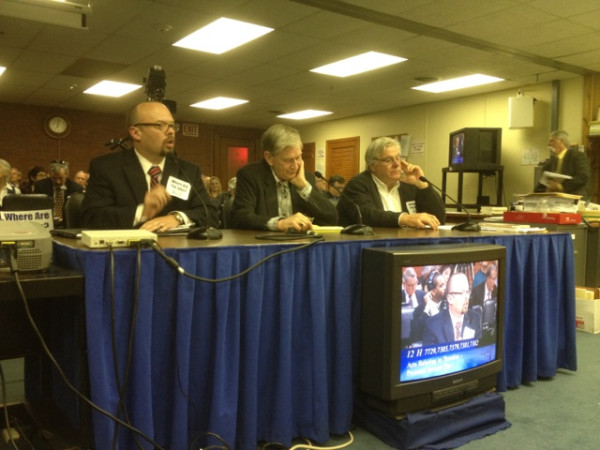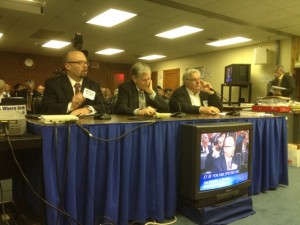 As the dust slowly settles on the carcass of 38 Studios, plenty of questions remain, and you can bet the entrails will be picked over thoroughly. Some of the most entertaining questions are about how the debacle happened, since it’s such a delicious tale of arrogant insiders getting their comeuppance. (Of course it would be more delicious if we weren’t on the hook to pay for it.) But there are also dull questions about important matters: what to do with the state’s economic development apparatus, the Rhode Island Economic Development Corporation.
As the dust slowly settles on the carcass of 38 Studios, plenty of questions remain, and you can bet the entrails will be picked over thoroughly. Some of the most entertaining questions are about how the debacle happened, since it’s such a delicious tale of arrogant insiders getting their comeuppance. (Of course it would be more delicious if we weren’t on the hook to pay for it.) But there are also dull questions about important matters: what to do with the state’s economic development apparatus, the Rhode Island Economic Development Corporation.
RIEDC was formed under the Almond administration, when the Department of Economic Development was closed and those responsibilities moved over to the Port Authority, which was renamed. The Port Authority was chosen because of its unlimited bonding authority, a fluke of legislative drafting when that agency was originally created. As of 1995, when this happened, the only other agency with this kind of authority, the Public Building Authority, was discredited by DiPrete-era abuses and on the way out. In other words EDC was born with extraordinary powers and has used them extensively, which is partly why the state’s debt nearly doubled during the Carcieri administration.
In the 17 years since then, RIEDC has been through more directors than I can count. Some have been widely admired, and some just looked good. Keith Stokes, the current most recent director has, I believe, set a longevity record by lasting three years, though I welcome reader corrections to my director timetable. He is widely held in high regard, but the agency has a vague and difficult set of goals, so no one should be surprised when the failures are legion and the successes short-lived.
The 38 Studios debacle reminds longtime observers of previous ones, like Alpha-Beta, and the Wyatt jail in Central Falls. And just as the debacles recur, so do the ensuing reports. We’re all looking forward now to a report from the RI Public Expenditure Council about how to shake up EDC. But that’s nothing new, either.
Three years ago there was a report about EDC from a panel of worthies headed by Al Verrecchia, chairman and former CEO of Hasbro. The panel suggested that EDC needed shaking up, but their report ultimately contained precious little of use about how to do that. For example, the report said the agency was without focus and alternately complained they didn’t spend enough time working with already-existing local companies and that they didn’t have a good marketing approach to attract companies from elsewhere. Both might be true, but was the report’s suggestion that EDC concentrate on both really the best way to improve the focus? The report was too easily interpreted as an endorsement of what EDC was already doing. Essentially, the message was “keep it up, but do it better,” even if some of the report text struggled to say something else.
What to do
It’s possible to see the agency’s discredit as an advantage. Might it be possible to dream that we can discard the destructive and expensive things the agency does and replace them with activities that actually help the economy? My vote for what’s really needed around here? Information.
EDC could usefully refashion itself into a research agency. If agency staff actually spent significant time studying the economy and the local markets in an intellectually honest and rigorous way, some practically useful recommendations for action would be bound to arise from that work. This is the kind of thing that no individual company can take on, but an agency like EDC could produce information vital to all of them.
Perusing the EDC web site, there is a lot of information available, but it’s all the kind of thing you can get from the PBN book of lists or from Census Department or BLS web sites. They provide a handy list of tax incentives and programs, but what do they provide to help people make business decisions? That is, beyond “what government program should I apply for?”
On the EDC web site, I can learn which are the top employers in the state, and I can learn which economic sectors employ the most people, but there is precious little one might use to make important decisions. Where can I learn whether there is a shortage of machinists? Who do I ask about unmet credit demand? Is it banks or family and friends who finance most new RI businesses? What proportion of venture-backed businesses survive five years? What stage businesses have the most trouble getting credit? What are the important barriers to export markets for RI businesses?
Who needs this information? Someone who aspires to be a machinist would, of course. Someone who wants to start a business, or a bank interested in expanding its business lending portfolio, might also find it useful. A business contemplating expansion, perhaps. Oh, and General Assembly members who routinely assert that this or that would be good for the economy without any idea whether it’s really true could benefit. But most of all, the people who craft economic development policy would find real information vital. Or they should.
EDC is in a unique position that could allow it to gather — and analyze — useful data about the local economy. They could be doing business surveys, worker surveys, surveys of bankers and investors, analyses of credit markets, classifying foreclosures. They could be hosting conferences of academics to present research about these topics, or offering research fellowships at Brown or URI for economists willing to spend time looking at the RI economy. They could present a public lecture series on the subjects important to the state’s economy, modeled after the Geek Dinners (that a previous EDC director helped begin). In short, they could actually present valuable information to help people make important economic decisions. Would it be expensive? Not compared to the status quo.
Research doesn’t just mean accumulating information in a single place, even if that’s a handy service. It means analysis: counting things, classifying them, and coming to conclusions about them. It means tracking events and interpreting them. It means finding information that isn’t already available and creating the tools necessary to anticipate events and follow trends. It means cultivating a staff able to do these analyses and with the intellectual confidence to follow where the data lead, and whomever they offend.
This, of course, is not the path we’ve taken. What we have now is an agency that does some good service and quite a bit of harm. We have some important programs housed in an agency that frequently acts like nothing so much as a state-funded corporate lobbyist. Our state deserves better and wouldn’t it be nice to have an agency that tells us all what’s going on around us instead of hiding it?
























